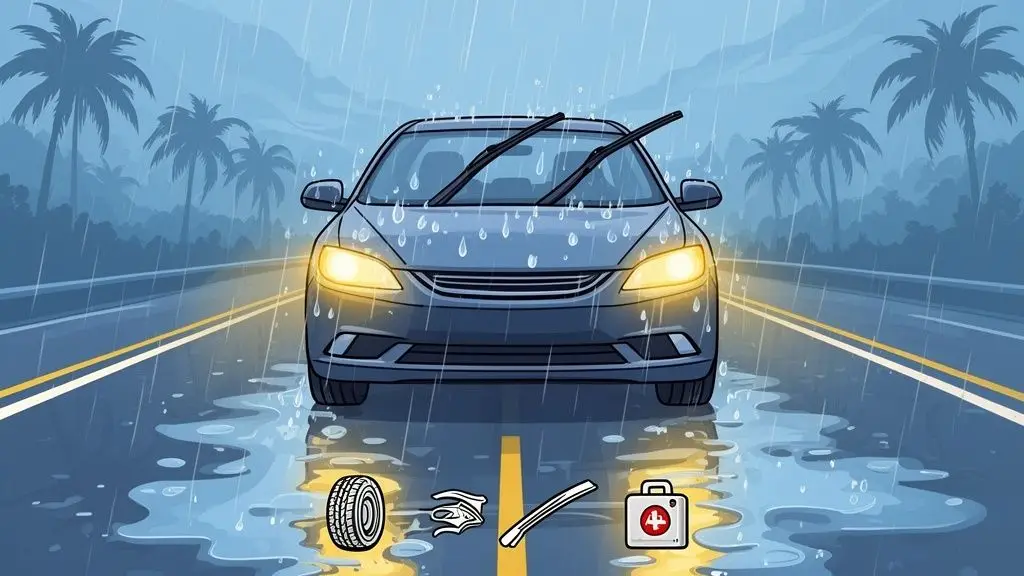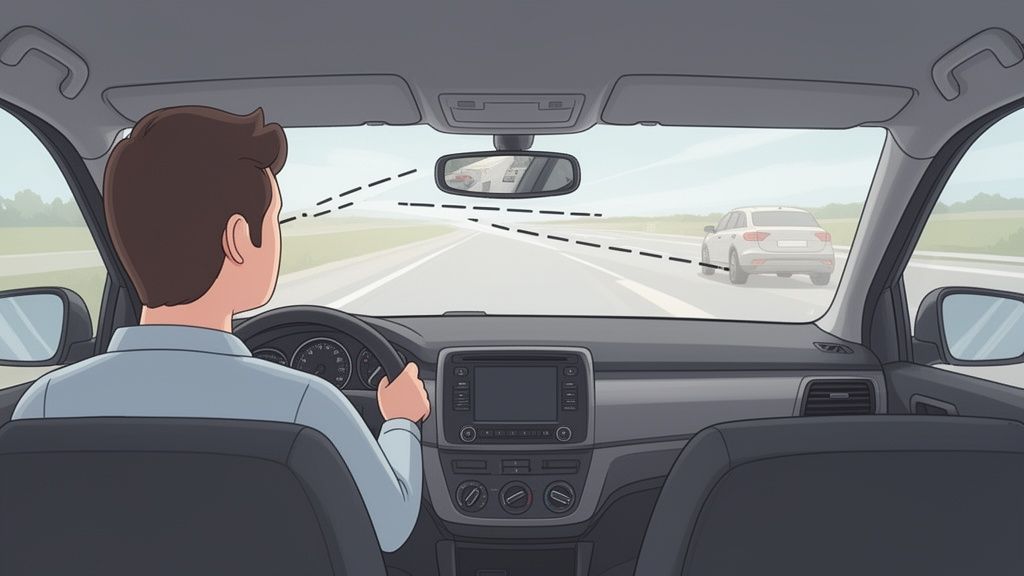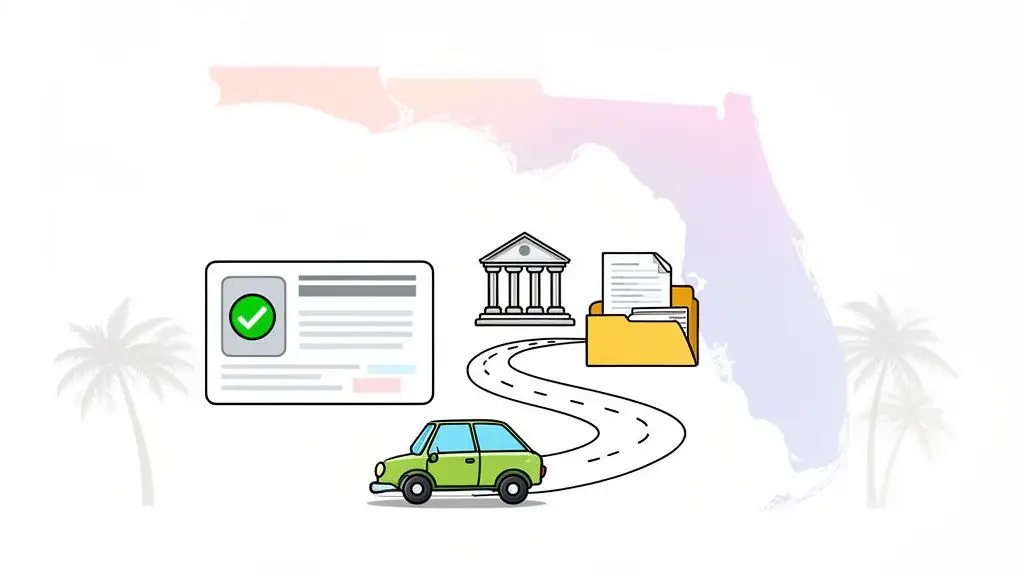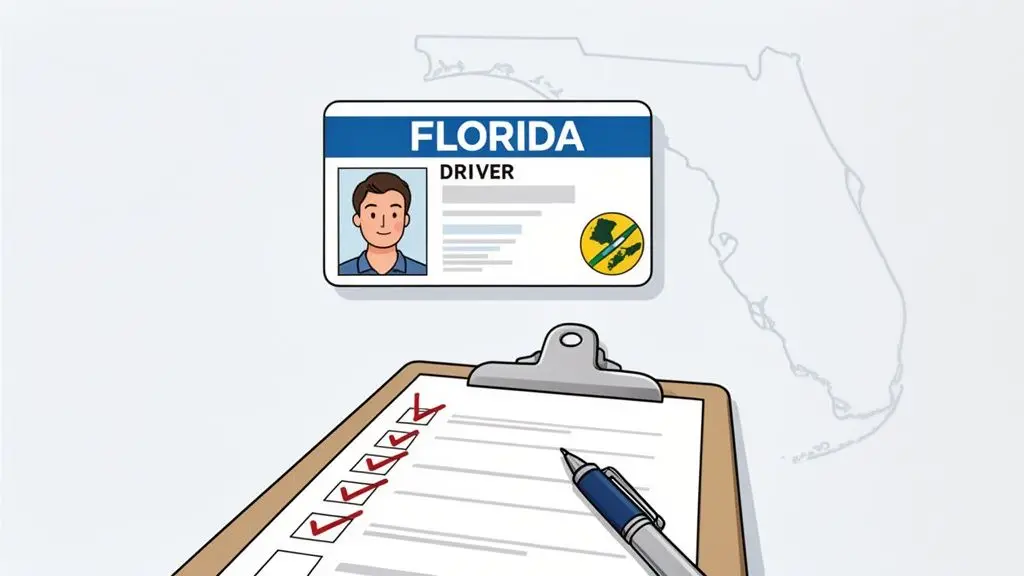Getting a traffic ticket in Florida can be a real headache. You have to pay a fine. Plus, you might worry about points on your license. These points can make your car insurance more expensive. The good news is, you have options. For most common tickets, a state-approved Basic Driver Improvement (BDI) course is the best way to keep points off your record.
Understanding the Florida Driver Point System
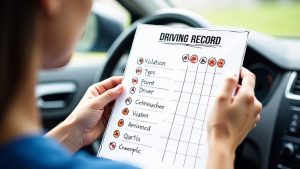
So, how does this all work? When you get a ticket for a moving violation in Florida, the state adds points to your license. These points are like warnings for the Florida Highway Safety and Motor Vehicles (FLHSMV). They also alert your insurance company. The points show that you might be a higher-risk driver.
For example, a speeding ticket for going 15 mph over the limit gives you three points. This might not seem like a lot. However, the points can add up very fast. Many other states use a similar system to track driving habits. This shows how seriously these violations are taken. For more information, you can find your state’s official rules on its Department of Motor Vehicles website.
The Real Cost of Points
The fine on the ticket is only the start. The long-term cost is often much worse.
As points pile up, here is what you can expect:
- Higher Insurance Costs: Your insurance company will likely raise your rates. Just one ticket can cost you hundreds more over the next few years.
- Risk of License Suspension: The FLHSMV is very strict. If you get 12 points in 12 months, you could face a 30-day license suspension. That’s a big problem. The Florida government provides clear guidelines on point suspensions.
- A Long-Lasting Record: Points do go away over time. But the violation itself can stay on your record for years. This can affect you the next time you look for car insurance.
To help you understand, here is a quick look at some common violations and their points.
Common Florida Traffic Violations and Their Point Values
This table shows how many points are assigned for common traffic tickets in Florida. It helps drivers see how serious each violation is.
| Violation Type | Assigned Points | Potential Consequences |
|---|---|---|
| Speeding (15 mph or less over limit) | 3 points | Fines, potential insurance increase |
| Speeding (16 mph or more over limit) | 4 points | Higher fines, big insurance impact |
| Running a Red Light or Stop Sign | 3 points | Fines, risk of a collision |
| Reckless Driving | 4 points | Criminal charge, large fines, possible suspension |
| Leaving the Scene of a Collision | 6 points | Severe penalties, license revocation |
Understanding these point values helps you see the consequences clearly. Knowing the risks is the first step. It helps you make a smart choice after getting a ticket. This includes taking a course to keep your driving record spotless.
Choosing the Right Florida Driver Improvement Course
When you get a traffic ticket, you might feel lost. The good news is that you have choices. Picking the right basic driver improvement course is the best way to handle the situation. Florida has different state-approved courses. Each course is designed for a specific need.
For most common moving violations, like speeding, the 4-Hour Basic Driver Improvement (BDI) course is what you need. You can choose to take this course to keep points off your license. A great benefit is that it also stops your insurance company from raising your rates due to the ticket. Taking a Florida traffic school online makes this very easy.
Finding the Right Course for Your Situation
Not all tickets are the same. The 4-hour BDI course does not cover every situation. A judge might order you to take a longer course for a more serious violation. Therefore, it is important to know the differences between the courses.
Here’s a quick list of the main courses available:
- 4-Hour Basic Driver Improvement (BDI): This is the course you take to dismiss a normal ticket and avoid points. It can sometimes also get you an insurance discount.
- 8-Hour Intermediate Driver Improvement (IDI): You cannot sign up for this course on your own. A judge usually requires it for more serious violations.
- 12-Hour Advanced Driver Improvement (ADI): This course is for drivers with a suspended or revoked license. It is a required step to get your driving privileges back.
- Driver Education Traffic Safety / DETS Course 6-Hour: This is for new drivers under the age of 18 years who are getting their first learner’s permit. It teaches an extensive rules of the road and the dangers of impaired driving.
- First Time Driver / DATA Course 4-Hour: This is for new drivers 18 years of age and older who are getting their first learner’s permit. It teaches all basic rules of the road and the dangers of impaired driving.
- Mature Driver Course: This course is for drivers 55 and older. It helps them refresh their driving skills and may qualify them for an insurance discount.
Safe driving education is a national priority. The National Highway Traffic Safety Administration (NHTSA) offers many resources for drivers of all ages, including tips for teen drivers.
Florida Driver Improvement Course Comparison
To make things clearer, let’s look at which course to take and when. Choosing the right one is very important. It ensures you meet the requirements from the court and the FLHSMV.
| Course Name | Primary Use Case | Key Benefit |
|---|---|---|
| 4-Hour BDI | Elective for minor traffic tickets | Prevents points and insurance increases |
| 8-Hour IDI | Court-ordered for specific violations | Fulfills judicial requirements |
| DETS Course | New drivers under 18 years of age seeking a permit | Teaches essential road safety skills |
| DATA Course | New drivers 18 years of age and older seeking a permit | Teaches essential road safety skills |
| Mature Driver | Drivers 55+ seeking a discount | Refreshes skills and lowers insurance costs |
In the end, picking the correct course from a Florida approved traffic school is the most important step.
From Ticket to Clean Record: Your BDI Course Game Plan
Getting a traffic ticket is a stressful moment. But you should not panic. The process to keep points off your license is simple. For most moving violations, the key is to complete a Basic Driver Improvement (BDI) course.
This chart shows the common paths drivers take after getting a ticket.
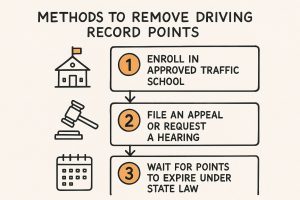
As you can see, choosing traffic school is your best choice to stop points. It is a smart move that puts you in control.
What to Do After You Get a Ticket
Okay, you have a ticket. What is next? You have a very important deadline. You have only 30 days from the ticket date to tell the Clerk of Court you want to take a course. You must inform the clerk in the county where you got the ticket. You will tell them you are choosing to attend a basic driver course in Florida.
This is a strict deadline. If you miss the 30-day window, you lose your chance. The points will likely be added to your license.
After you tell the clerk and pay your court fees, you can sign up for a state-approved Florida online traffic school. The online option is very convenient. You can study when you have free time. You do not have to go to a classroom.
Finishing the Process
Once you finish the my Florida traffic school material and pass the final exam, you get a certificate of completion. Keep this certificate safe. It is very important.
Now for the last, crucial step. You must give that certificate to the Clerk of Court before their deadline. Many people forget this step. Even if you finish the course, if you do not submit the proof on time, you will still get the points. It is a good idea to call the clerk’s office a few days after you submit it. This will confirm they received it. This helps make sure your record stays clean.
The Financial Benefits of a Clean Driving Record
When you get a traffic ticket, you may only think about the fine. But that is just the beginning. The real financial pain often comes later. It comes from higher insurance rates. Choosing to complete a basic driver improvement course is a smart financial decision. It can save you money for years.
Let’s look at two drivers. Both get the same minor speeding ticket.
Scenario A: Paying the Fine Quickly
Driver A wants to finish quickly. They pay the fine, which might be around $150. They think the problem is solved.
Later, their insurance renewal bill arrives. Because of the points on their license, their premium went up by $25 a month. That adds up to $300 a year. Those points will likely affect their insurance rates for at least three years. So, that one ticket will cost them an extra $900 in insurance.
The total cost over three years is $1,050 or more.
Scenario B: Making a Smart Investment
Driver B thinks long-term. Instead of just paying, they choose to attend a Florida online traffic school. The total upfront cost is about $180. This includes the course and a reduced fine. It costs a little more at first. But completing the course means no points go on their record.
The biggest financial benefit of a BDI course is avoiding the insurance rate increase that usually follows a ticket.
Because their driving record stays clean, their insurance premium does not change. Driver B’s total cost for the ticket is just $180.
By investing a little time and a bit more money upfront, Driver B saved almost $900. This shows how you can turn a long-term problem into a small, one-time expense. You protect your record and your wallet.
Advanced Courses for More Serious Driving Situations

Sometimes, the standard 4-hour course is not enough. For more serious violations, a judge might order you to take a longer traffic school course.
If this happens, you will likely need to complete the 8-Hour Intermediate Driver Improvement (IDI) course. This course is not a choice. If the court orders it, you must take it. You must complete it to satisfy the judge’s order.
This course goes deeper than the basic class. It focuses on the driving behaviors that led to the court order.
When Your License Is on the Line
What if your situation is even more serious? For drivers with a suspended or revoked license, Florida requires the 12-Hour Advanced Driver Improvement (ADI) course.
This course is not for a simple speeding ticket. The ADI course is usually for drivers who are called a Habitual Traffic Offender (HTO). It is also for drivers who lost their license from getting too many points.
The purpose of the ADI course is to find the cause of your driving problems. It gives you the knowledge to get your license reinstated. It is a necessary step to get back on the road legally.
Finishing the ADI course is how you get your license back. It proves to the FLHSMV that you are serious about driving safely. These advanced courses are the only way forward for these situations.
Frequently Asked Questions About Florida Traffic School
Getting a traffic ticket can be confusing. Figuring out what to do next leads to many questions. We understand. Let’s answer some common questions Florida drivers ask about traffic school.
How Long Do I Have to Choose Traffic School?
This is very important. In Florida, you have a strict 30-day deadline from the day you get the ticket. You must tell the Clerk of Court that you plan to take a basic driver improvement (BDI) course.
If you miss that 30-day window, you lose the option. You will have to pay the full fine, and the points will be added to your driving record.
Can Any Traffic School Remove Points?
No, and this is a common mistake. To avoid points, you must complete a course from a Florida online traffic school that is approved by the state. The Florida Highway Safety and Motor Vehicles department keeps a list of all approved driver improvement schools.
Always check that the school you choose is on the FLHSMV’s approved list. A course from an unapproved provider is a waste of time and money. The court will not accept it.
How Many Times Can I Take a BDI Course?
Florida law limits how often you can use the traffic school option. You should use it wisely.
Here are the rules:
- You can take a basic driver traffic school course once every 12 months.
- You can only take it a total of five times in your lifetime.
Because you have limited chances, it is smart to save this option for tickets that carry points. Do not waste a chance on a minor ticket with no points.
Ready to protect your driving record and avoid insurance hikes? We offer convenient, state-approved online courses that fit your schedule.

